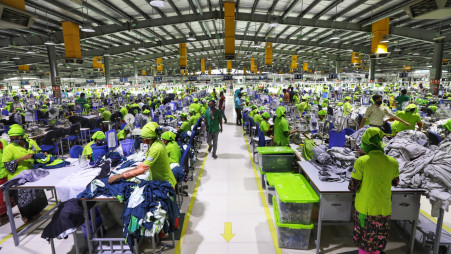Govt decides 30% maximum RMG wastage ceiling
The rates earlier were proposed at 25% for basic readymade garment items, 28% for specialised items and 3% for sweaters and socks

The commerce ministry has now further increased the maximum wastage rate in producing apparel items from raw materials to 30%.
As per the latest decision by the commerce ministry, maximum wastage rates will be 27% for basic items, 30% for specialised items and 4% for sweaters and socks, according to a circular issued by the ministry on Sunday.
In the face of objections from readymade garment exporters, the commerce ministry has readjusted the wastage rates in the span of five months.
The rates earlier were proposed at 25% for basic readymade garment items, 28% for specialised items and 3% for sweaters and socks.
In 1998, the ministry set a maximum wastage rate at 16% in manufacturing garment items from yarns and fabrics.
In January this year, the Bangladesh Knitwear Manufacturers and Exporters Association (BKMEA) and the Bangladesh Garment Manufacturers and Exporters Association (BGMEA) sent a proposal to the commerce ministry to increase the maximum wastage rate to 40%.
Later, the Export Promotion Bureau sent a letter to 20 companies, asking them to find out the actual wastage rate. Only two companies responded to the bureau's inquiry, saying their wastage rate was more than 40%.
After that, the commerce ministry formed a committee to verify the actual wastage rates in garment factories. After inspecting six factories – each producing basic knitwear, specialised items, and sweaters and socks, the committee recommended setting the maximum wastage rate by averaging the amount of wastage of similar factories.
In August, the committee proposed 25% wastage rate for basic knitwear including T-shirts, polo shirts, trousers, shorts, skirts, pyjamas; 28% for specialised items like rompers, tank tops, dresses, gowns, hoodies, and lingerie items; and 3% for items like jumpers, pullovers, cardigans, vests, and socks.
A member of the committee formed by the commerce ministry told The Business Standard, "We have found differences in the wastage rate depending on the types of machines used by the factories. Therefore, we have recommended that the ministry determine wastage rates based on the average wastage."
The ministry decided to fix the rates after a meeting with representatives of the BKMEA, the BGMEA and the BTMA on 22 August. The BKMEA, however, strongly objected to this decision.
The commerce ministry again formed a committee to review the decision in the light of objections from BGMEA and BKMEA. As per the recommendation of the committee, the ministry issued an order on Sunday to increase wastage rates for basic knitwear, specialised items and sweaters and socks.
But The BKMEA is still not satisfied with the revised wastage rates. Its executive president Mohammad Hatem told The Business Standard on Sunday, "The wastage rates have not been set, considering practicality. It will increase complexities, rather than solving problems. We do not accept the wastage rates."
"The actual wastage in factories is much higher than the prescribed rate. If the wastage rate was set at 35%, we would accept the decision," he added.
According to stakeholders, if the production wastage rate of an export-oriented apparel manufacturer – who enjoys duty-free facility for raw material imports – is less than the prescribed rate, they sell the excess raw materials in the open market. This eventually damages the business of local companies that produce raw material.
On the other hand, if the actual wastage rate is higher than the rate set by the government, the authorities impose duty, supplementary duty and VAT on the extra wastages.
According to RMG exporters, Bangladesh basically used to produce tubular-shaped basic T-shirts in the 1090s and the wastage rate was 16% at the time, but, in the current era of fashion, production types and qualities are completely different.
Various types of yarns and fabrics are used to make knitwear products of different designs and qualities where the wastage rate is 20-40% and the rate is even more in some cases, they added.
In this age of state-of-the-art machinery, the wastage rate should be at least 35%, they noted.
Abdul Hai Sarkar, chairman of Purbani Group and former president of the BTMA, said the rate of wastage also depends on the types of cotton used to produce yarn.
He said, "The wastage rate should be set in such a way that exporters are not harmed. It should also be made sure the bond facilities are not misused."



 Keep updated, follow The Business Standard's Google news channel
Keep updated, follow The Business Standard's Google news channel
















